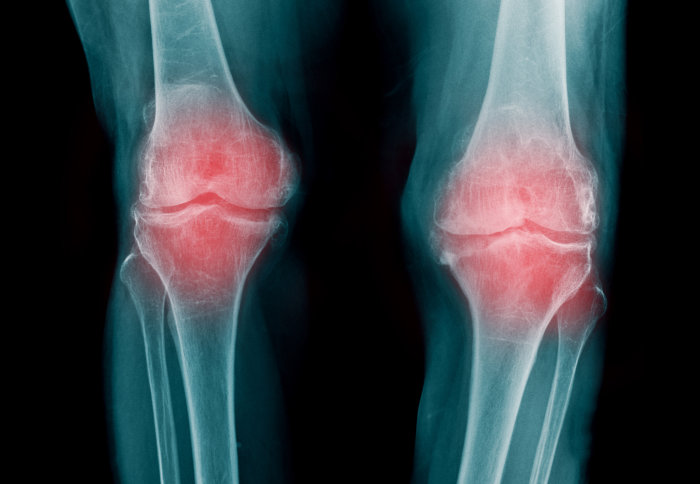Major donation will advance research into musculoskeletal disorders

x-ray of a knee joint showing severe osteoarthritis in both knees
Imperial will pioneer advances into the diagnosis, prevention, and treatment of devastating musculoskeletal diseases thanks to a philanthropic gift.
Musculoskeletal diseases are conditions that affect the muscles, bones, or joints – such as osteoporosis, rheumatoid arthritis and osteoarthritis. An estimated 17.8 million people live with a musculoskeletal condition in the UK, and the diseases can have a profound impact on their quality of life, causing pain and disability.
Our vision is to spearhead the development of musculoskeletal treatments, helping patients to remain active and able to pursue the lives they want. Professor Justin Cobb Chair in Orthopaedic Surgery
The donation, made by the Sackler Trust, will support research at the College’s world-leading MSk Lab, with the aim of developing improved surgical interventions, better diagnostic tools, and greater understanding of human movement and the impact of pain on the functioning of the musculoskeletal system.
The MSk Lab is a multidisciplinary and inter-faculty centre for research into musculoskeletal health and bone and joint disease. It brings together over 30 full-time surgeons, physiotherapists, scientists and engineers all seeking to understand musculoskeletal health and degeneration and to prevent and treat a wide array of problems associated with impaired mobility.
Collaborating closely with patients, the Lab works to make the best possible musculoskeletal treatment available to the maximum number of people, helping them remain active and independent for longer.
New beginnings
In 2019, the Lab will relocate to the Michael Uren Biomedical Engineering Research Hub at White City, a new facility that will co-locate clinicians, engineers, and scientists to pioneer advances in new and affordable medical technology. The hub will house a clinical facility side-by-side with multidisciplinary laboratories and offices for translational research initiatives, providing patients with access to the latest innovations in healthcare.

In recognition of the gift, Imperial’s world-leading MSk Lab will be renamed the Sackler Centre for Musculoskeletal Research when the move is complete.
Professor Alison McGregor said: “Our most innovative work has always emerged from collaboration. The planned move to the Michael Uren Biomedical Engineering Research Hub marks a new opportunity for the Lab to scale up its interdisciplinary work, leading to stronger and more efficient collaborations.We are sincerely grateful for the Sackler Trust’s support at this pivotal moment in the Lab’s evolution.”

Professor Justin Cobb said: “Our vision is to spearhead the development of musculoskeletal treatments, helping patients to remain active and able to pursue the lives they want.
"This gift will pave the way for new tools and technologies, rehabilitation methods, and pioneering surgical techniques. We thank the Sackler trust for supporting this important work.”
The battle for healthy bone aging
The gift will support a Senior Lectureship in Musculoskeletal Sciences, to be held by Dr Richard Abel. His team is researching osteoporosis, a bone wasting disease that causes bones to become brittle and fracture, usually during a bump or fall. The disease is underdiagnosed, and most patients only receive treatment after having already suffered a fracture.
Dr Abel’s research is exploring why some people’s bones age healthily, while others break. In work funded by the National Osteoporosis Society, Dr Abel’s team is testing whether bone might become fragile in old age because the basic nano-structural building blocks become stiff, preventing bones from bending to absorb energy during a fall.
The gift from the Sackler Trust will help Imperial translate this research into the real world by designing devices for diagnosing osteoporosis and identifying nano treatment targets for preventing fractures. This will radically improve the lives of people living with osteoporosis and their families.
The impact of pain on movement
Dr Paul Strutton, Senior Lecturer in Neurophysiology in the MSk Lab, is investigating the central nervous system control of human movement and the impact pain has on this control.
His team researches motor and sensory systems in health and disease of the musculoskeletal system. They have particular interest in understanding the interactions between neural pathways controlling movement and how these might be utilised to develop neuromonitoring and rehabilitation tools for people with low back pain and spinal cord injury.
Post-doctoral research associate Dr Sam Hughes has an interest in the impact of ageing on the musculoskeletal system and the development of associated chronic pain. Together, they are interested in the variability of chronic pain symptoms in patients with musculoskeletal disease. They are also currently developing models of musculoskeletal pain and researching new ways to manage chronic pain in patients, funded by the Pain Relief Foundation.
Article text (excluding photos or graphics) © Imperial College London.
Photos and graphics subject to third party copyright used with permission or © Imperial College London.
Reporter
Deborah Evanson
Communications Division